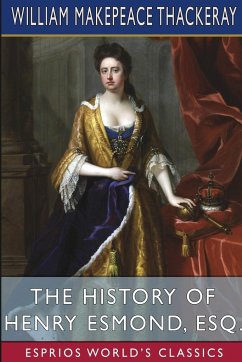The History of Henry Esmond is a historical novel by William Makepeace Thackeray, originally published in 1852. The book tells the story of the early life of Henry Esmond, a colonel in the service of Queen Anne of England. A typical example of Victorian historical novels, Thackeray's work of historical fiction tells its tale against the backdrop of late 17th- and early 18th-century England - specifically, major events surrounding the English Restoration - and utilises characters both real (but dramatised) and imagined. It weaves its central character into a number of events such as the Glorious Revolution, the War of the Spanish Succession, the Hamilton-Mohun Duel and the Hanoverian Succession.








